BMP4002 Business Law: Analysis of the UK Legal System for Business
VerifiedAdded on 2023/06/18
|8
|2775
|187
Report
AI Summary
This report provides a comprehensive overview of the UK legal system for business law, covering classifications of law, sources of law, and employment law. It begins by defining laws and identifying the legal systems in the UK, then explains civil and criminal law classifications, along with the roles of the High Court and Supreme Court. The report further explores case law and legislation as sources of law, detailing the process of making legislation and delegated legislation. Finally, it examines statutory duties of employers to their employees under the Employment Law 1996, as well as wrongful and unfair dismissal actions. The document concludes by emphasizing the importance of adhering to legal principles for maintaining order and justice within the business environment. Desklib provides access to similar solved assignments and study resources for students.
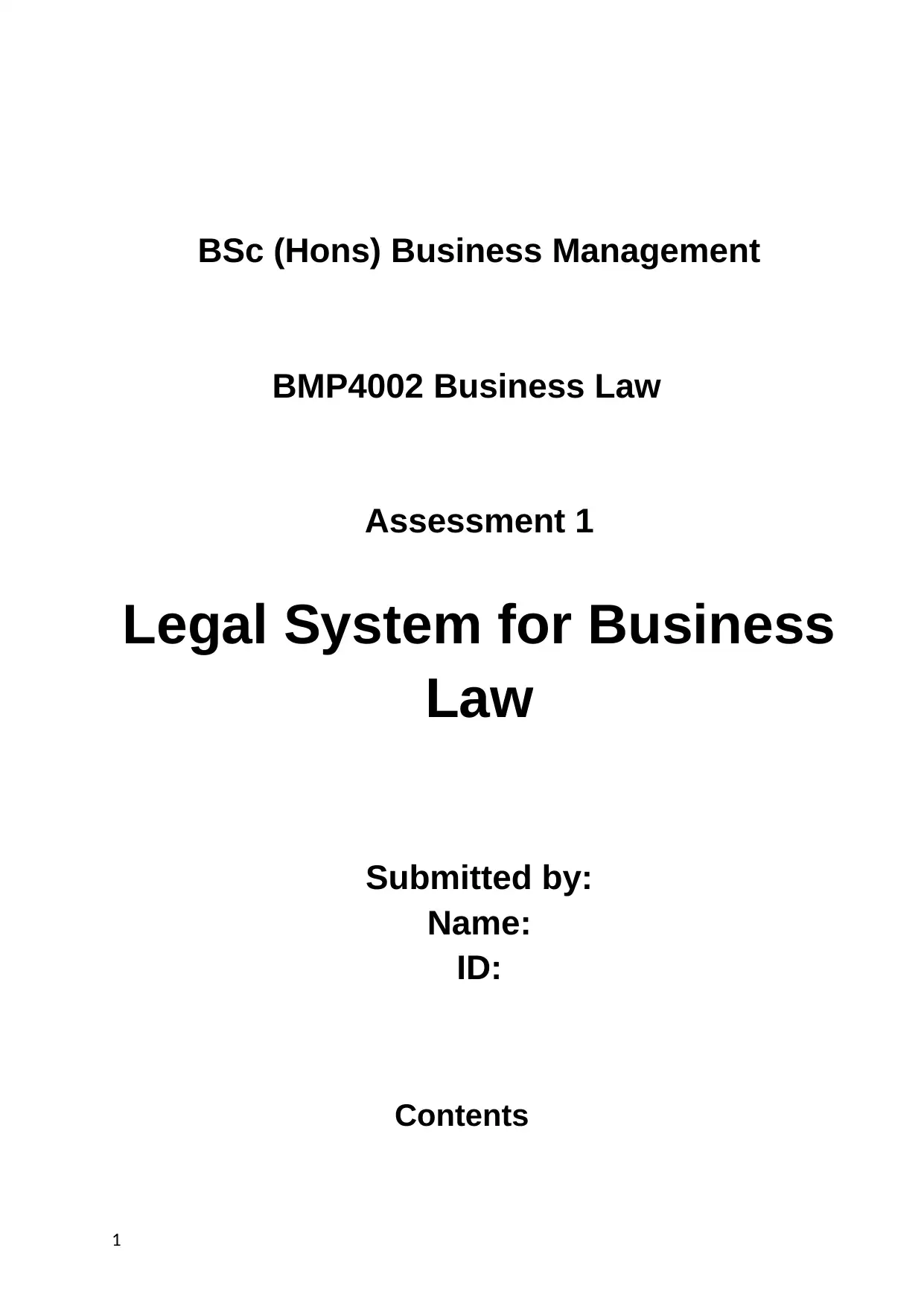
BSc (Hons) Business Management
BMP4002 Business Law
Assessment 1
Legal System for Business
Law
Submitted by:
Name:
ID:
Contents
1
BMP4002 Business Law
Assessment 1
Legal System for Business
Law
Submitted by:
Name:
ID:
Contents
1
Paraphrase This Document
Need a fresh take? Get an instant paraphrase of this document with our AI Paraphraser
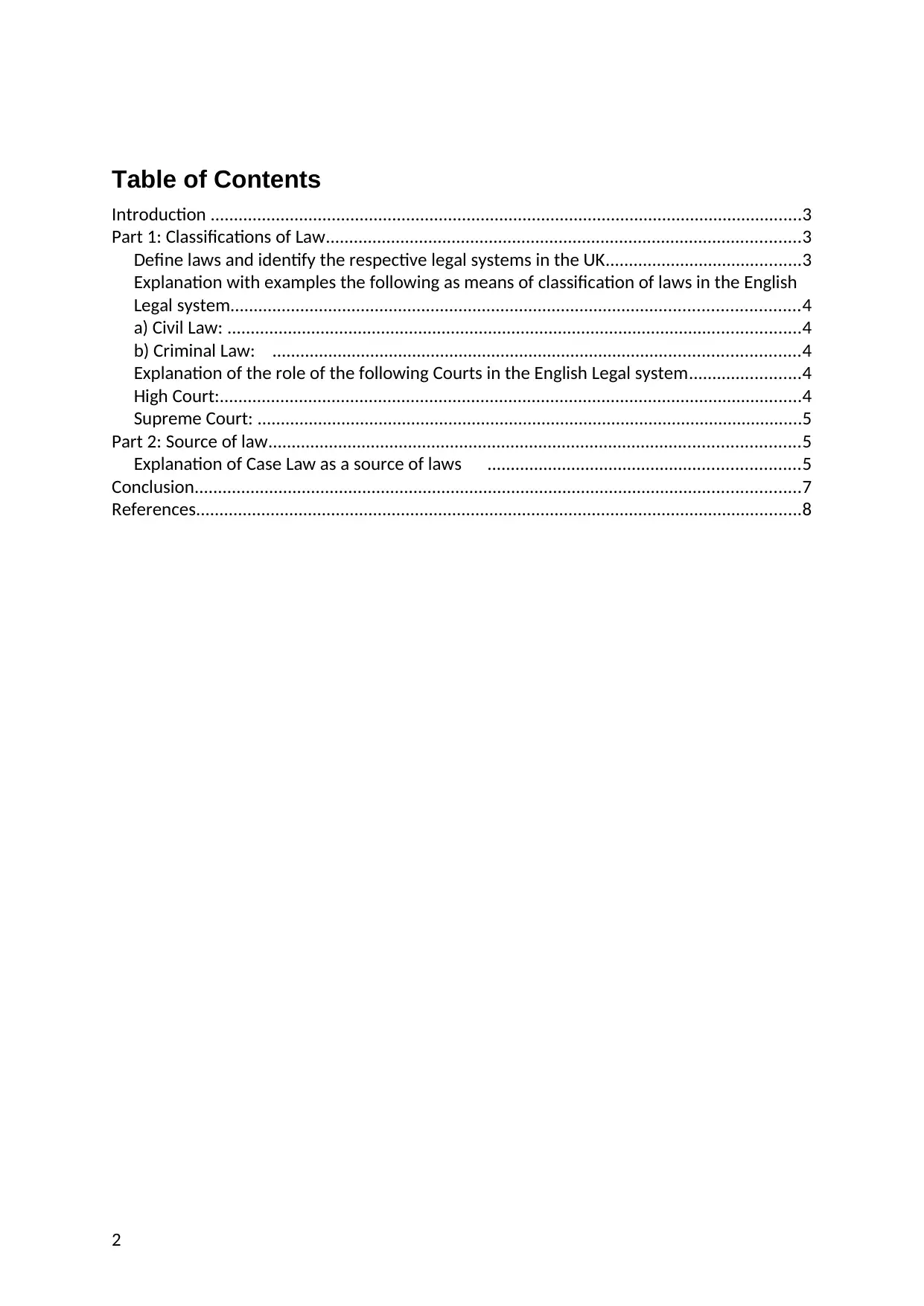
Table of Contents
Introduction ...............................................................................................................................3
Part 1: Classifications of Law......................................................................................................3
Define laws and identify the respective legal systems in the UK..........................................3
Explanation with examples the following as means of classification of laws in the English
Legal system..........................................................................................................................4
a) Civil Law: ...........................................................................................................................4
b) Criminal Law: .................................................................................................................4
Explanation of the role of the following Courts in the English Legal system........................4
High Court:.............................................................................................................................4
Supreme Court: .....................................................................................................................5
Part 2: Source of law..................................................................................................................5
Explanation of Case Law as a source of laws ...................................................................5
Conclusion..................................................................................................................................7
References..................................................................................................................................8
2
Introduction ...............................................................................................................................3
Part 1: Classifications of Law......................................................................................................3
Define laws and identify the respective legal systems in the UK..........................................3
Explanation with examples the following as means of classification of laws in the English
Legal system..........................................................................................................................4
a) Civil Law: ...........................................................................................................................4
b) Criminal Law: .................................................................................................................4
Explanation of the role of the following Courts in the English Legal system........................4
High Court:.............................................................................................................................4
Supreme Court: .....................................................................................................................5
Part 2: Source of law..................................................................................................................5
Explanation of Case Law as a source of laws ...................................................................5
Conclusion..................................................................................................................................7
References..................................................................................................................................8
2
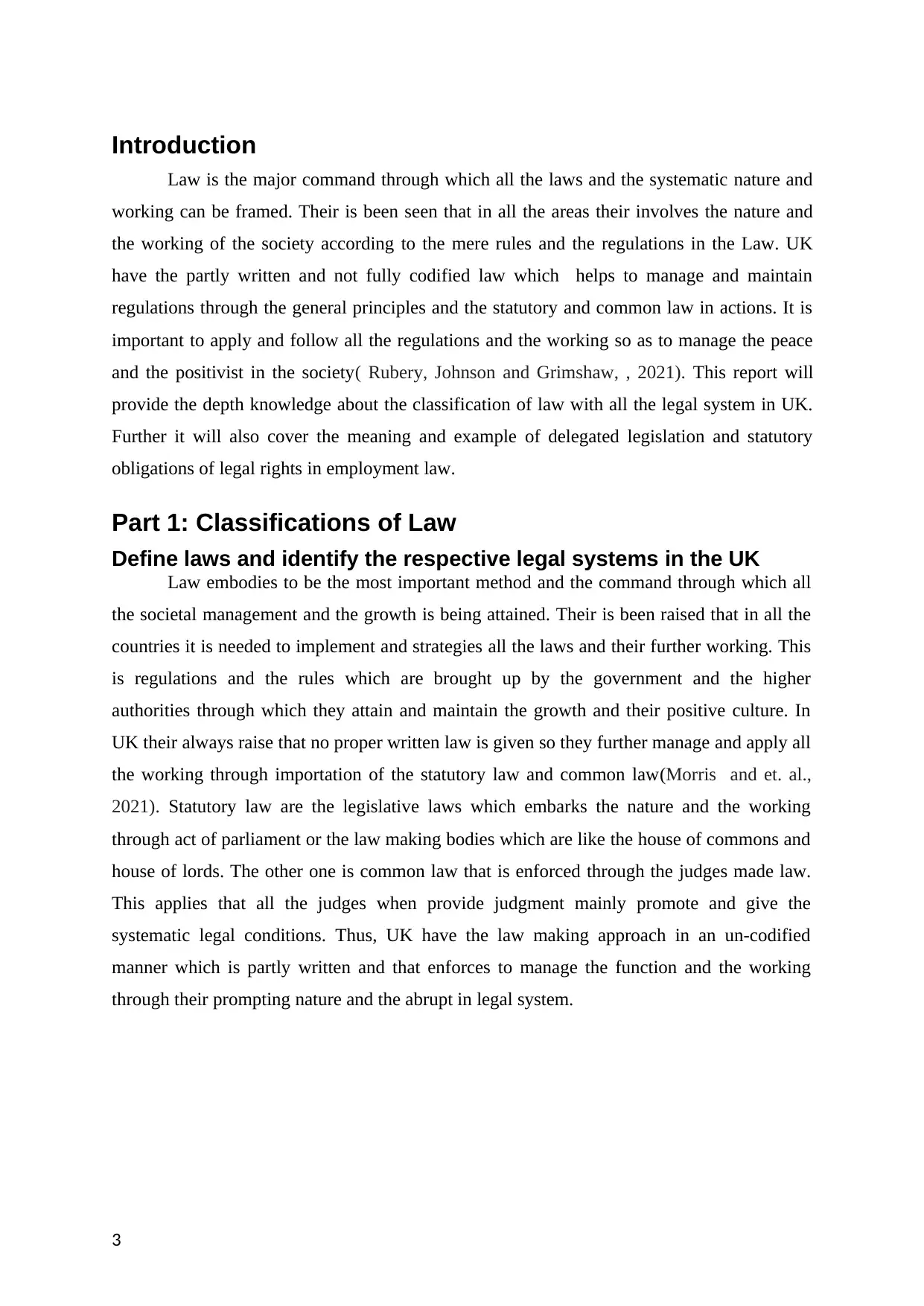
Introduction
Law is the major command through which all the laws and the systematic nature and
working can be framed. Their is been seen that in all the areas their involves the nature and
the working of the society according to the mere rules and the regulations in the Law. UK
have the partly written and not fully codified law which helps to manage and maintain
regulations through the general principles and the statutory and common law in actions. It is
important to apply and follow all the regulations and the working so as to manage the peace
and the positivist in the society( Rubery, Johnson and Grimshaw, , 2021). This report will
provide the depth knowledge about the classification of law with all the legal system in UK.
Further it will also cover the meaning and example of delegated legislation and statutory
obligations of legal rights in employment law.
Part 1: Classifications of Law
Define laws and identify the respective legal systems in the UK
Law embodies to be the most important method and the command through which all
the societal management and the growth is being attained. Their is been raised that in all the
countries it is needed to implement and strategies all the laws and their further working. This
is regulations and the rules which are brought up by the government and the higher
authorities through which they attain and maintain the growth and their positive culture. In
UK their always raise that no proper written law is given so they further manage and apply all
the working through importation of the statutory law and common law(Morris and et. al.,
2021). Statutory law are the legislative laws which embarks the nature and the working
through act of parliament or the law making bodies which are like the house of commons and
house of lords. The other one is common law that is enforced through the judges made law.
This applies that all the judges when provide judgment mainly promote and give the
systematic legal conditions. Thus, UK have the law making approach in an un-codified
manner which is partly written and that enforces to manage the function and the working
through their prompting nature and the abrupt in legal system.
3
Law is the major command through which all the laws and the systematic nature and
working can be framed. Their is been seen that in all the areas their involves the nature and
the working of the society according to the mere rules and the regulations in the Law. UK
have the partly written and not fully codified law which helps to manage and maintain
regulations through the general principles and the statutory and common law in actions. It is
important to apply and follow all the regulations and the working so as to manage the peace
and the positivist in the society( Rubery, Johnson and Grimshaw, , 2021). This report will
provide the depth knowledge about the classification of law with all the legal system in UK.
Further it will also cover the meaning and example of delegated legislation and statutory
obligations of legal rights in employment law.
Part 1: Classifications of Law
Define laws and identify the respective legal systems in the UK
Law embodies to be the most important method and the command through which all
the societal management and the growth is being attained. Their is been raised that in all the
countries it is needed to implement and strategies all the laws and their further working. This
is regulations and the rules which are brought up by the government and the higher
authorities through which they attain and maintain the growth and their positive culture. In
UK their always raise that no proper written law is given so they further manage and apply all
the working through importation of the statutory law and common law(Morris and et. al.,
2021). Statutory law are the legislative laws which embarks the nature and the working
through act of parliament or the law making bodies which are like the house of commons and
house of lords. The other one is common law that is enforced through the judges made law.
This applies that all the judges when provide judgment mainly promote and give the
systematic legal conditions. Thus, UK have the law making approach in an un-codified
manner which is partly written and that enforces to manage the function and the working
through their prompting nature and the abrupt in legal system.
3
⊘ This is a preview!⊘
Do you want full access?
Subscribe today to unlock all pages.

Trusted by 1+ million students worldwide
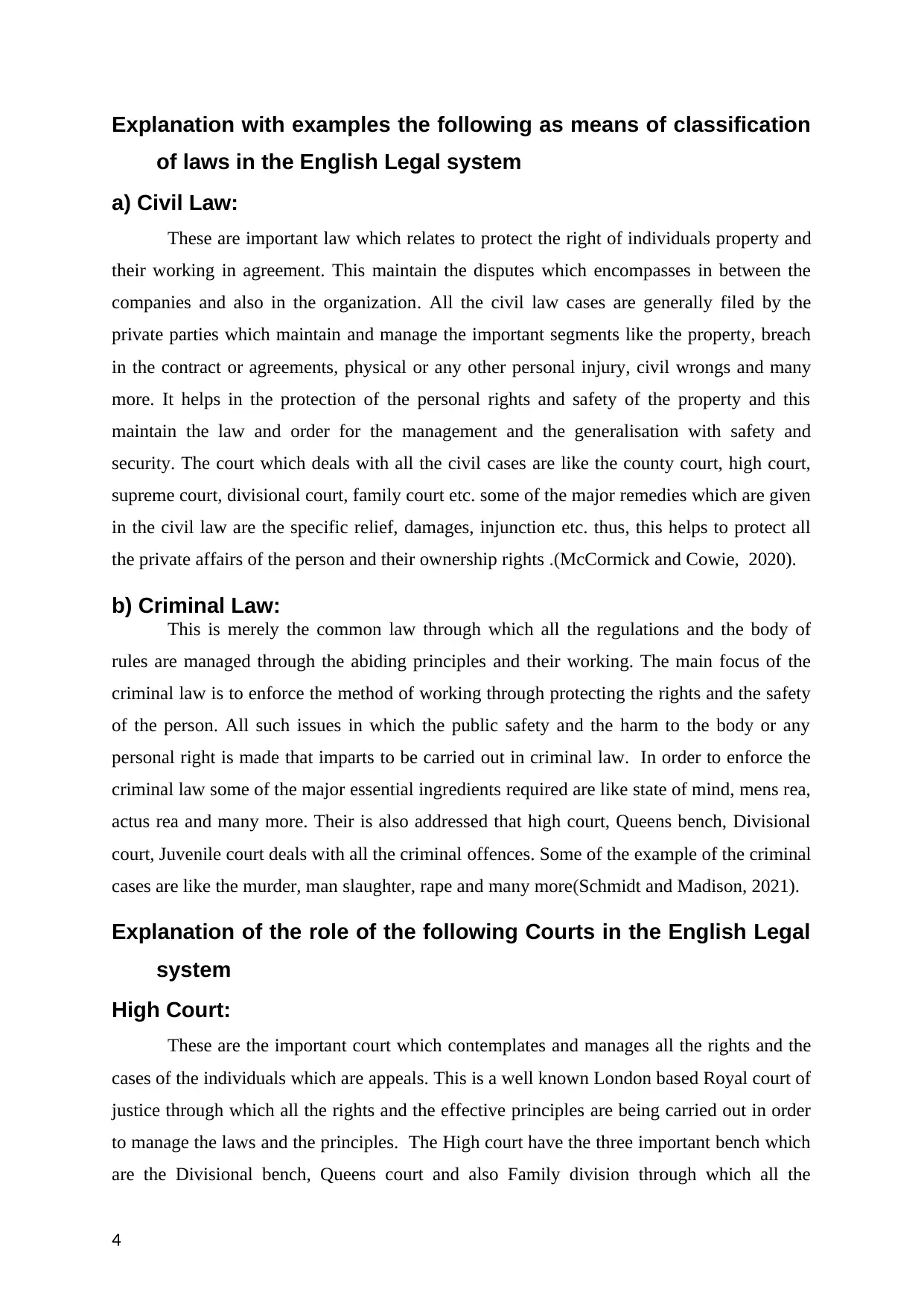
Explanation with examples the following as means of classification
of laws in the English Legal system
a) Civil Law:
These are important law which relates to protect the right of individuals property and
their working in agreement. This maintain the disputes which encompasses in between the
companies and also in the organization. All the civil law cases are generally filed by the
private parties which maintain and manage the important segments like the property, breach
in the contract or agreements, physical or any other personal injury, civil wrongs and many
more. It helps in the protection of the personal rights and safety of the property and this
maintain the law and order for the management and the generalisation with safety and
security. The court which deals with all the civil cases are like the county court, high court,
supreme court, divisional court, family court etc. some of the major remedies which are given
in the civil law are the specific relief, damages, injunction etc. thus, this helps to protect all
the private affairs of the person and their ownership rights .(McCormick and Cowie, 2020).
b) Criminal Law:
This is merely the common law through which all the regulations and the body of
rules are managed through the abiding principles and their working. The main focus of the
criminal law is to enforce the method of working through protecting the rights and the safety
of the person. All such issues in which the public safety and the harm to the body or any
personal right is made that imparts to be carried out in criminal law. In order to enforce the
criminal law some of the major essential ingredients required are like state of mind, mens rea,
actus rea and many more. Their is also addressed that high court, Queens bench, Divisional
court, Juvenile court deals with all the criminal offences. Some of the example of the criminal
cases are like the murder, man slaughter, rape and many more(Schmidt and Madison, 2021).
Explanation of the role of the following Courts in the English Legal
system
High Court:
These are the important court which contemplates and manages all the rights and the
cases of the individuals which are appeals. This is a well known London based Royal court of
justice through which all the rights and the effective principles are being carried out in order
to manage the laws and the principles. The High court have the three important bench which
are the Divisional bench, Queens court and also Family division through which all the
4
of laws in the English Legal system
a) Civil Law:
These are important law which relates to protect the right of individuals property and
their working in agreement. This maintain the disputes which encompasses in between the
companies and also in the organization. All the civil law cases are generally filed by the
private parties which maintain and manage the important segments like the property, breach
in the contract or agreements, physical or any other personal injury, civil wrongs and many
more. It helps in the protection of the personal rights and safety of the property and this
maintain the law and order for the management and the generalisation with safety and
security. The court which deals with all the civil cases are like the county court, high court,
supreme court, divisional court, family court etc. some of the major remedies which are given
in the civil law are the specific relief, damages, injunction etc. thus, this helps to protect all
the private affairs of the person and their ownership rights .(McCormick and Cowie, 2020).
b) Criminal Law:
This is merely the common law through which all the regulations and the body of
rules are managed through the abiding principles and their working. The main focus of the
criminal law is to enforce the method of working through protecting the rights and the safety
of the person. All such issues in which the public safety and the harm to the body or any
personal right is made that imparts to be carried out in criminal law. In order to enforce the
criminal law some of the major essential ingredients required are like state of mind, mens rea,
actus rea and many more. Their is also addressed that high court, Queens bench, Divisional
court, Juvenile court deals with all the criminal offences. Some of the example of the criminal
cases are like the murder, man slaughter, rape and many more(Schmidt and Madison, 2021).
Explanation of the role of the following Courts in the English Legal
system
High Court:
These are the important court which contemplates and manages all the rights and the
cases of the individuals which are appeals. This is a well known London based Royal court of
justice through which all the rights and the effective principles are being carried out in order
to manage the laws and the principles. The High court have the three important bench which
are the Divisional bench, Queens court and also Family division through which all the
4
Paraphrase This Document
Need a fresh take? Get an instant paraphrase of this document with our AI Paraphraser
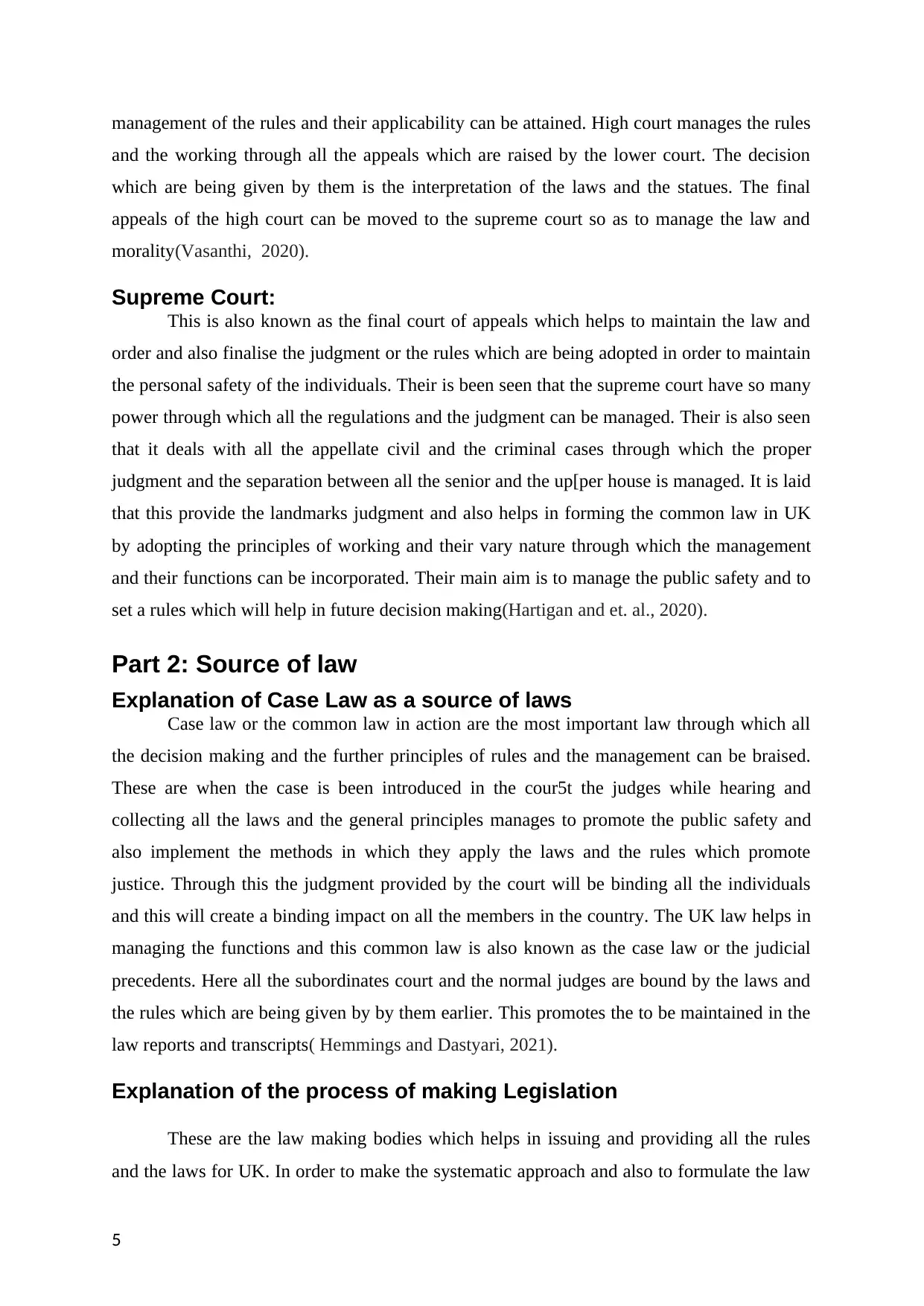
management of the rules and their applicability can be attained. High court manages the rules
and the working through all the appeals which are raised by the lower court. The decision
which are being given by them is the interpretation of the laws and the statues. The final
appeals of the high court can be moved to the supreme court so as to manage the law and
morality(Vasanthi, 2020).
Supreme Court:
This is also known as the final court of appeals which helps to maintain the law and
order and also finalise the judgment or the rules which are being adopted in order to maintain
the personal safety of the individuals. Their is been seen that the supreme court have so many
power through which all the regulations and the judgment can be managed. Their is also seen
that it deals with all the appellate civil and the criminal cases through which the proper
judgment and the separation between all the senior and the up[per house is managed. It is laid
that this provide the landmarks judgment and also helps in forming the common law in UK
by adopting the principles of working and their vary nature through which the management
and their functions can be incorporated. Their main aim is to manage the public safety and to
set a rules which will help in future decision making(Hartigan and et. al., 2020).
Part 2: Source of law
Explanation of Case Law as a source of laws
Case law or the common law in action are the most important law through which all
the decision making and the further principles of rules and the management can be braised.
These are when the case is been introduced in the cour5t the judges while hearing and
collecting all the laws and the general principles manages to promote the public safety and
also implement the methods in which they apply the laws and the rules which promote
justice. Through this the judgment provided by the court will be binding all the individuals
and this will create a binding impact on all the members in the country. The UK law helps in
managing the functions and this common law is also known as the case law or the judicial
precedents. Here all the subordinates court and the normal judges are bound by the laws and
the rules which are being given by by them earlier. This promotes the to be maintained in the
law reports and transcripts( Hemmings and Dastyari, 2021).
Explanation of the process of making Legislation
These are the law making bodies which helps in issuing and providing all the rules
and the laws for UK. In order to make the systematic approach and also to formulate the law
5
and the working through all the appeals which are raised by the lower court. The decision
which are being given by them is the interpretation of the laws and the statues. The final
appeals of the high court can be moved to the supreme court so as to manage the law and
morality(Vasanthi, 2020).
Supreme Court:
This is also known as the final court of appeals which helps to maintain the law and
order and also finalise the judgment or the rules which are being adopted in order to maintain
the personal safety of the individuals. Their is been seen that the supreme court have so many
power through which all the regulations and the judgment can be managed. Their is also seen
that it deals with all the appellate civil and the criminal cases through which the proper
judgment and the separation between all the senior and the up[per house is managed. It is laid
that this provide the landmarks judgment and also helps in forming the common law in UK
by adopting the principles of working and their vary nature through which the management
and their functions can be incorporated. Their main aim is to manage the public safety and to
set a rules which will help in future decision making(Hartigan and et. al., 2020).
Part 2: Source of law
Explanation of Case Law as a source of laws
Case law or the common law in action are the most important law through which all
the decision making and the further principles of rules and the management can be braised.
These are when the case is been introduced in the cour5t the judges while hearing and
collecting all the laws and the general principles manages to promote the public safety and
also implement the methods in which they apply the laws and the rules which promote
justice. Through this the judgment provided by the court will be binding all the individuals
and this will create a binding impact on all the members in the country. The UK law helps in
managing the functions and this common law is also known as the case law or the judicial
precedents. Here all the subordinates court and the normal judges are bound by the laws and
the rules which are being given by by them earlier. This promotes the to be maintained in the
law reports and transcripts( Hemmings and Dastyari, 2021).
Explanation of the process of making Legislation
These are the law making bodies which helps in issuing and providing all the rules
and the laws for UK. In order to make the systematic approach and also to formulate the law
5
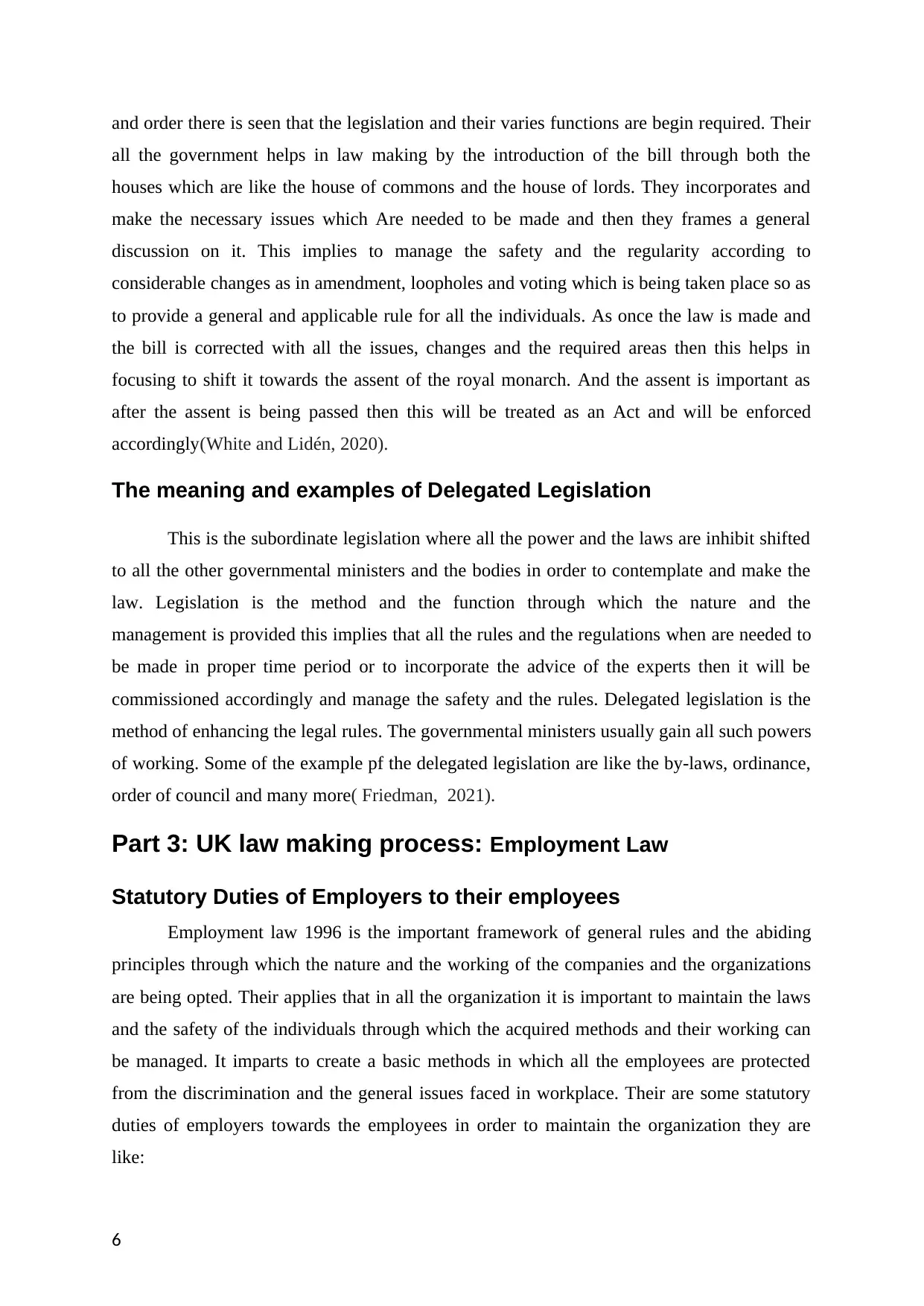
and order there is seen that the legislation and their varies functions are begin required. Their
all the government helps in law making by the introduction of the bill through both the
houses which are like the house of commons and the house of lords. They incorporates and
make the necessary issues which Are needed to be made and then they frames a general
discussion on it. This implies to manage the safety and the regularity according to
considerable changes as in amendment, loopholes and voting which is being taken place so as
to provide a general and applicable rule for all the individuals. As once the law is made and
the bill is corrected with all the issues, changes and the required areas then this helps in
focusing to shift it towards the assent of the royal monarch. And the assent is important as
after the assent is being passed then this will be treated as an Act and will be enforced
accordingly(White and Lidén, 2020).
The meaning and examples of Delegated Legislation
This is the subordinate legislation where all the power and the laws are inhibit shifted
to all the other governmental ministers and the bodies in order to contemplate and make the
law. Legislation is the method and the function through which the nature and the
management is provided this implies that all the rules and the regulations when are needed to
be made in proper time period or to incorporate the advice of the experts then it will be
commissioned accordingly and manage the safety and the rules. Delegated legislation is the
method of enhancing the legal rules. The governmental ministers usually gain all such powers
of working. Some of the example pf the delegated legislation are like the by-laws, ordinance,
order of council and many more( Friedman, 2021).
Part 3: UK law making process: Employment Law
Statutory Duties of Employers to their employees
Employment law 1996 is the important framework of general rules and the abiding
principles through which the nature and the working of the companies and the organizations
are being opted. Their applies that in all the organization it is important to maintain the laws
and the safety of the individuals through which the acquired methods and their working can
be managed. It imparts to create a basic methods in which all the employees are protected
from the discrimination and the general issues faced in workplace. Their are some statutory
duties of employers towards the employees in order to maintain the organization they are
like:
6
all the government helps in law making by the introduction of the bill through both the
houses which are like the house of commons and the house of lords. They incorporates and
make the necessary issues which Are needed to be made and then they frames a general
discussion on it. This implies to manage the safety and the regularity according to
considerable changes as in amendment, loopholes and voting which is being taken place so as
to provide a general and applicable rule for all the individuals. As once the law is made and
the bill is corrected with all the issues, changes and the required areas then this helps in
focusing to shift it towards the assent of the royal monarch. And the assent is important as
after the assent is being passed then this will be treated as an Act and will be enforced
accordingly(White and Lidén, 2020).
The meaning and examples of Delegated Legislation
This is the subordinate legislation where all the power and the laws are inhibit shifted
to all the other governmental ministers and the bodies in order to contemplate and make the
law. Legislation is the method and the function through which the nature and the
management is provided this implies that all the rules and the regulations when are needed to
be made in proper time period or to incorporate the advice of the experts then it will be
commissioned accordingly and manage the safety and the rules. Delegated legislation is the
method of enhancing the legal rules. The governmental ministers usually gain all such powers
of working. Some of the example pf the delegated legislation are like the by-laws, ordinance,
order of council and many more( Friedman, 2021).
Part 3: UK law making process: Employment Law
Statutory Duties of Employers to their employees
Employment law 1996 is the important framework of general rules and the abiding
principles through which the nature and the working of the companies and the organizations
are being opted. Their applies that in all the organization it is important to maintain the laws
and the safety of the individuals through which the acquired methods and their working can
be managed. It imparts to create a basic methods in which all the employees are protected
from the discrimination and the general issues faced in workplace. Their are some statutory
duties of employers towards the employees in order to maintain the organization they are
like:
6
⊘ This is a preview!⊘
Do you want full access?
Subscribe today to unlock all pages.

Trusted by 1+ million students worldwide
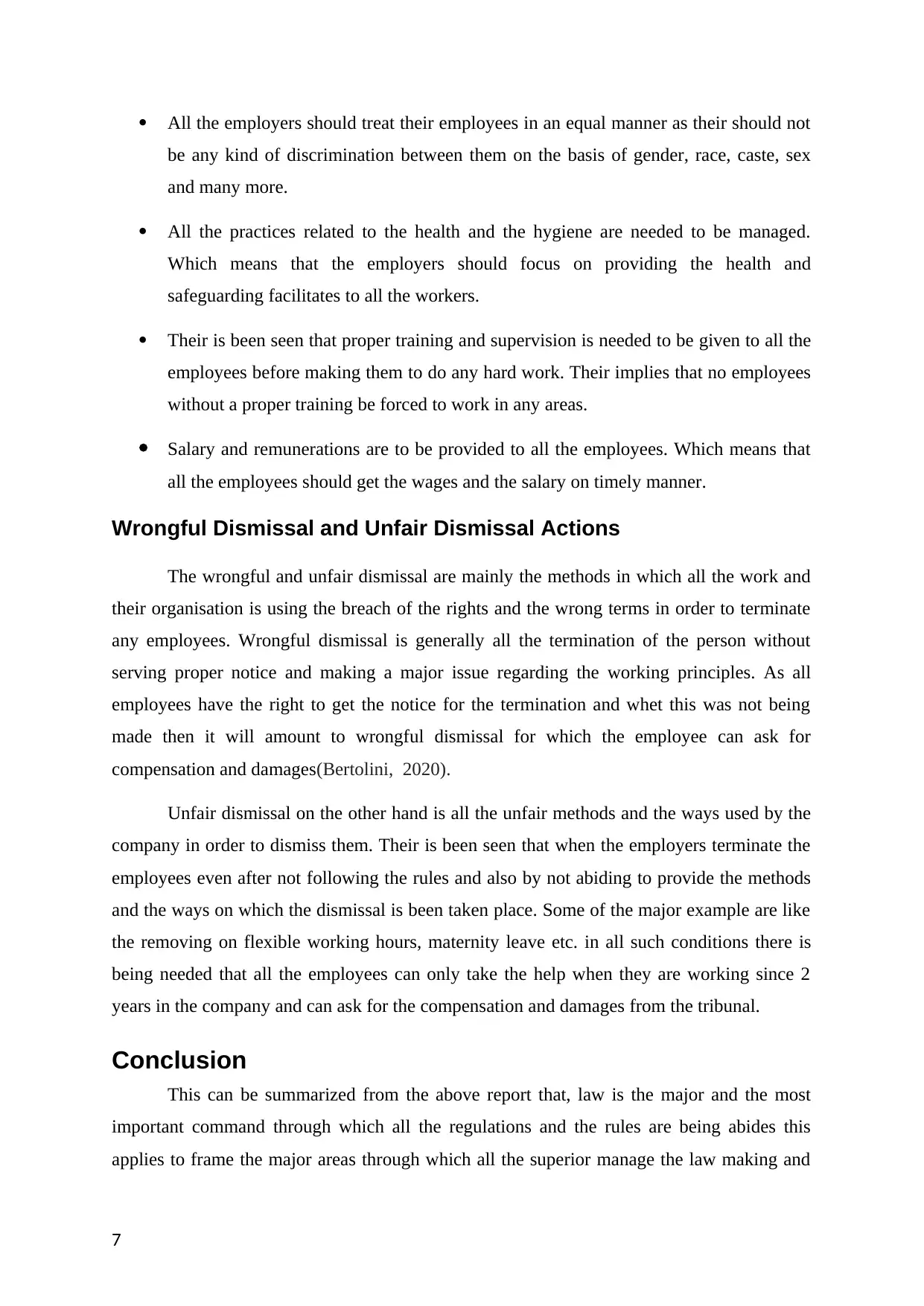
All the employers should treat their employees in an equal manner as their should not
be any kind of discrimination between them on the basis of gender, race, caste, sex
and many more.
All the practices related to the health and the hygiene are needed to be managed.
Which means that the employers should focus on providing the health and
safeguarding facilitates to all the workers.
Their is been seen that proper training and supervision is needed to be given to all the
employees before making them to do any hard work. Their implies that no employees
without a proper training be forced to work in any areas.
Salary and remunerations are to be provided to all the employees. Which means that
all the employees should get the wages and the salary on timely manner.
Wrongful Dismissal and Unfair Dismissal Actions
The wrongful and unfair dismissal are mainly the methods in which all the work and
their organisation is using the breach of the rights and the wrong terms in order to terminate
any employees. Wrongful dismissal is generally all the termination of the person without
serving proper notice and making a major issue regarding the working principles. As all
employees have the right to get the notice for the termination and whet this was not being
made then it will amount to wrongful dismissal for which the employee can ask for
compensation and damages(Bertolini, 2020).
Unfair dismissal on the other hand is all the unfair methods and the ways used by the
company in order to dismiss them. Their is been seen that when the employers terminate the
employees even after not following the rules and also by not abiding to provide the methods
and the ways on which the dismissal is been taken place. Some of the major example are like
the removing on flexible working hours, maternity leave etc. in all such conditions there is
being needed that all the employees can only take the help when they are working since 2
years in the company and can ask for the compensation and damages from the tribunal.
Conclusion
This can be summarized from the above report that, law is the major and the most
important command through which all the regulations and the rules are being abides this
applies to frame the major areas through which all the superior manage the law making and
7
be any kind of discrimination between them on the basis of gender, race, caste, sex
and many more.
All the practices related to the health and the hygiene are needed to be managed.
Which means that the employers should focus on providing the health and
safeguarding facilitates to all the workers.
Their is been seen that proper training and supervision is needed to be given to all the
employees before making them to do any hard work. Their implies that no employees
without a proper training be forced to work in any areas.
Salary and remunerations are to be provided to all the employees. Which means that
all the employees should get the wages and the salary on timely manner.
Wrongful Dismissal and Unfair Dismissal Actions
The wrongful and unfair dismissal are mainly the methods in which all the work and
their organisation is using the breach of the rights and the wrong terms in order to terminate
any employees. Wrongful dismissal is generally all the termination of the person without
serving proper notice and making a major issue regarding the working principles. As all
employees have the right to get the notice for the termination and whet this was not being
made then it will amount to wrongful dismissal for which the employee can ask for
compensation and damages(Bertolini, 2020).
Unfair dismissal on the other hand is all the unfair methods and the ways used by the
company in order to dismiss them. Their is been seen that when the employers terminate the
employees even after not following the rules and also by not abiding to provide the methods
and the ways on which the dismissal is been taken place. Some of the major example are like
the removing on flexible working hours, maternity leave etc. in all such conditions there is
being needed that all the employees can only take the help when they are working since 2
years in the company and can ask for the compensation and damages from the tribunal.
Conclusion
This can be summarized from the above report that, law is the major and the most
important command through which all the regulations and the rules are being abides this
applies to frame the major areas through which all the superior manage the law making and
7
Paraphrase This Document
Need a fresh take? Get an instant paraphrase of this document with our AI Paraphraser
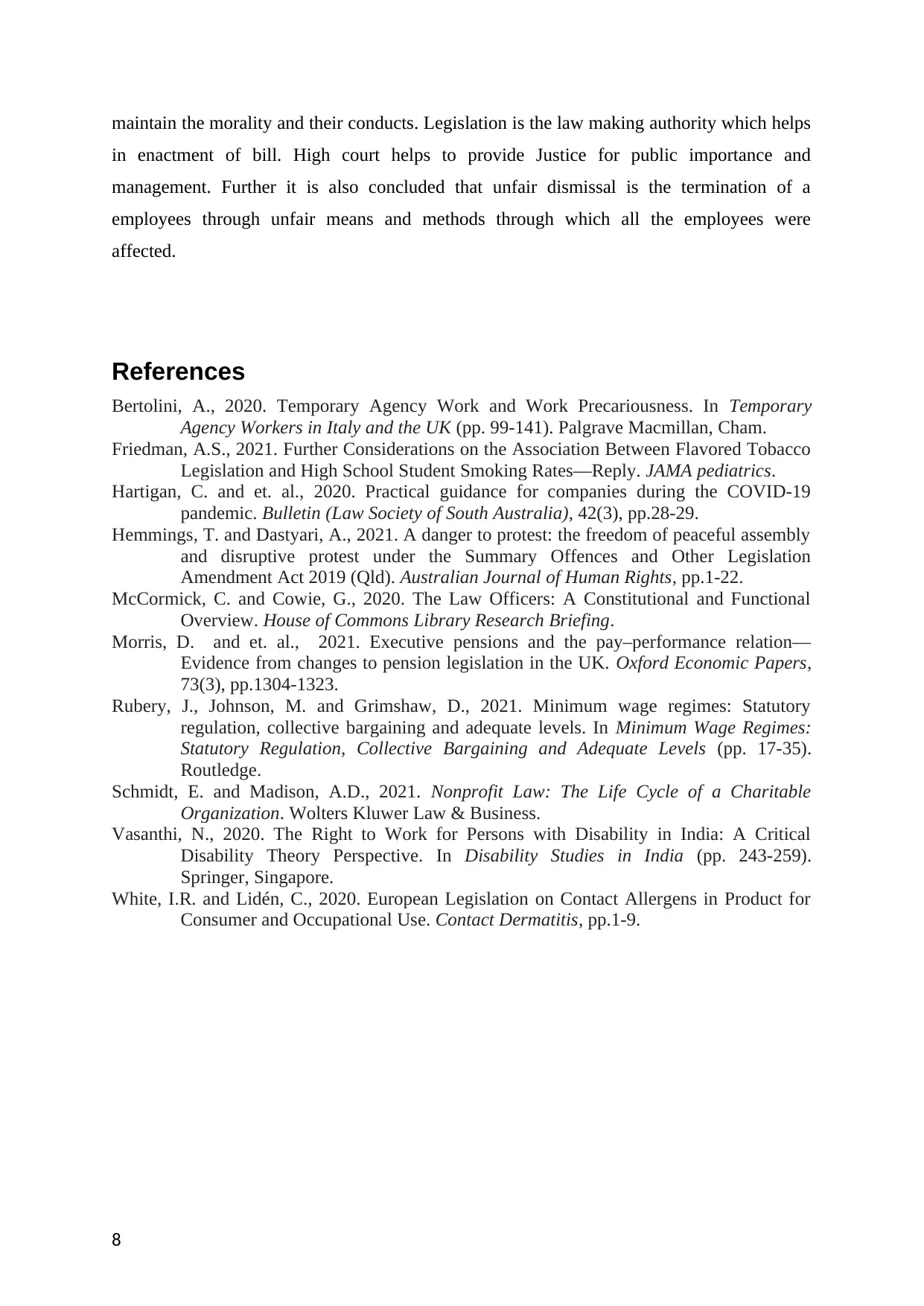
maintain the morality and their conducts. Legislation is the law making authority which helps
in enactment of bill. High court helps to provide Justice for public importance and
management. Further it is also concluded that unfair dismissal is the termination of a
employees through unfair means and methods through which all the employees were
affected.
References
Bertolini, A., 2020. Temporary Agency Work and Work Precariousness. In Temporary
Agency Workers in Italy and the UK (pp. 99-141). Palgrave Macmillan, Cham.
Friedman, A.S., 2021. Further Considerations on the Association Between Flavored Tobacco
Legislation and High School Student Smoking Rates—Reply. JAMA pediatrics.
Hartigan, C. and et. al., 2020. Practical guidance for companies during the COVID-19
pandemic. Bulletin (Law Society of South Australia), 42(3), pp.28-29.
Hemmings, T. and Dastyari, A., 2021. A danger to protest: the freedom of peaceful assembly
and disruptive protest under the Summary Offences and Other Legislation
Amendment Act 2019 (Qld). Australian Journal of Human Rights, pp.1-22.
McCormick, C. and Cowie, G., 2020. The Law Officers: A Constitutional and Functional
Overview. House of Commons Library Research Briefing.
Morris, D. and et. al., 2021. Executive pensions and the pay–performance relation—
Evidence from changes to pension legislation in the UK. Oxford Economic Papers,
73(3), pp.1304-1323.
Rubery, J., Johnson, M. and Grimshaw, D., 2021. Minimum wage regimes: Statutory
regulation, collective bargaining and adequate levels. In Minimum Wage Regimes:
Statutory Regulation, Collective Bargaining and Adequate Levels (pp. 17-35).
Routledge.
Schmidt, E. and Madison, A.D., 2021. Nonprofit Law: The Life Cycle of a Charitable
Organization. Wolters Kluwer Law & Business.
Vasanthi, N., 2020. The Right to Work for Persons with Disability in India: A Critical
Disability Theory Perspective. In Disability Studies in India (pp. 243-259).
Springer, Singapore.
White, I.R. and Lidén, C., 2020. European Legislation on Contact Allergens in Product for
Consumer and Occupational Use. Contact Dermatitis, pp.1-9.
8
in enactment of bill. High court helps to provide Justice for public importance and
management. Further it is also concluded that unfair dismissal is the termination of a
employees through unfair means and methods through which all the employees were
affected.
References
Bertolini, A., 2020. Temporary Agency Work and Work Precariousness. In Temporary
Agency Workers in Italy and the UK (pp. 99-141). Palgrave Macmillan, Cham.
Friedman, A.S., 2021. Further Considerations on the Association Between Flavored Tobacco
Legislation and High School Student Smoking Rates—Reply. JAMA pediatrics.
Hartigan, C. and et. al., 2020. Practical guidance for companies during the COVID-19
pandemic. Bulletin (Law Society of South Australia), 42(3), pp.28-29.
Hemmings, T. and Dastyari, A., 2021. A danger to protest: the freedom of peaceful assembly
and disruptive protest under the Summary Offences and Other Legislation
Amendment Act 2019 (Qld). Australian Journal of Human Rights, pp.1-22.
McCormick, C. and Cowie, G., 2020. The Law Officers: A Constitutional and Functional
Overview. House of Commons Library Research Briefing.
Morris, D. and et. al., 2021. Executive pensions and the pay–performance relation—
Evidence from changes to pension legislation in the UK. Oxford Economic Papers,
73(3), pp.1304-1323.
Rubery, J., Johnson, M. and Grimshaw, D., 2021. Minimum wage regimes: Statutory
regulation, collective bargaining and adequate levels. In Minimum Wage Regimes:
Statutory Regulation, Collective Bargaining and Adequate Levels (pp. 17-35).
Routledge.
Schmidt, E. and Madison, A.D., 2021. Nonprofit Law: The Life Cycle of a Charitable
Organization. Wolters Kluwer Law & Business.
Vasanthi, N., 2020. The Right to Work for Persons with Disability in India: A Critical
Disability Theory Perspective. In Disability Studies in India (pp. 243-259).
Springer, Singapore.
White, I.R. and Lidén, C., 2020. European Legislation on Contact Allergens in Product for
Consumer and Occupational Use. Contact Dermatitis, pp.1-9.
8
1 out of 8
Related Documents
Your All-in-One AI-Powered Toolkit for Academic Success.
+13062052269
info@desklib.com
Available 24*7 on WhatsApp / Email
![[object Object]](/_next/static/media/star-bottom.7253800d.svg)
Unlock your academic potential
Copyright © 2020–2026 A2Z Services. All Rights Reserved. Developed and managed by ZUCOL.


